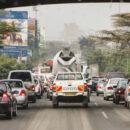Cote d’Ivoire and Ouattarra
 The man Ivorian Presidents love to hate
The man Ivorian Presidents love to hate
By Daniel Balint-Kurti
Ivory Coast, the one-time poster boy of West Africa, has seen its long-drawn-out crisis deepen since the end of last year. When the incumbent president, Laurent Gbagbo, was defeated in November presidential elections, his supporters had the results overturned. Now two men claim the presidency: Gbagbo and his rival Alassane Ouattara, a former Ivorian prime minister and economic czar whose electoral victory was recognised by the UN, the EU and the African Union.
A host of sanctions have been slapped on the country and thousands of UN and French peacekeepers guard Ouattara’s parallel government, which is holed up in a luxury hotel in the main city, Abidjan. Violence, however, has flared both upcountry and in Abidjan’s sprawling neighbourhood of Abobo.
The blame for this latest fiasco must lie squarely with Gbagbo. He has refused to accept elections that were meant to be the last step towards reuniting a country divided between rebel-held north and loyalist south for nearly ten years. But while it may be simple to apportion blame, working out how the Ivorian crisis could be resolved is far more problematic. As international bodies try to grapple with the messy situation, they should bear in mind that they are not just dealing with rival leaders, but with a population divided by years of toxic politics and propaganda.
The trouble in Ivory Coast now is to a large extent the result of xenophobic and ethnic hatred that was stirred up by Ivorian politicians in the mid-1990s. That hatred became largely focused on one person, Ouattara. Fearing Ouattara’s popularity, successive southern presidents labelled him as a closet foreigner who would sell the country to outside interests. Ouattara’s detractors also claimed that his ethnic northern credentials were bogus. The anti-Ouattara propaganda sharpened divisions between mainly Christian ethnic groups from the south and the mainly Muslim groups from the north.
The anti-Ouattara ball was set rolling after the death in 1993 of Ivorian president and founding father Felix Houphouí«t-Boigny. Ouattara, then Prime Minister, squared off against parliamentary Speaker Henri Konan Bédié for the succession. Bédié, a southerner from Houphouí«t-Boigny’s Baoulé ethnic group, won out – thanks partly to backing from former colonial master France – but he was determined that Ouattara should never pose a threat to his position again.
To this end, Bédié nurtured a philosophy called ivoirité or “Ivorianness” – the slippery idea of what it means to be Ivorian. Bédié used this murky notion to harness support for a change in the electoral code he had pushed through parliament a few months earlier, with the aim of making Ouattara ineligible for the presidency. A new clause stated that no one with a parent who was not “of Ivorian origin” could stand for president. Bédié and his supporters advanced an array of arguments to prove that Ouattara’s parents were both foreign, and that Ouattara himself was from Burkina Faso, Ivory Coast’s poorer northern neighbour. Ivoirité became central





